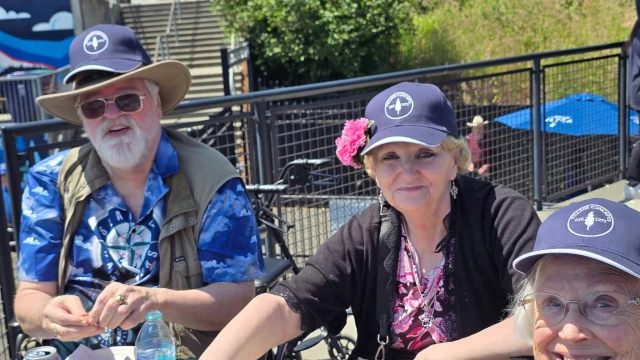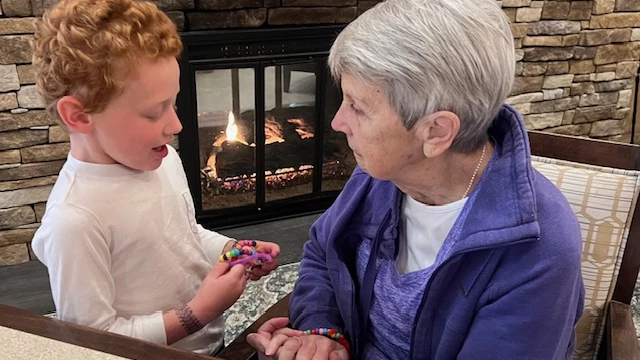SEDRO-WOOLLEY — Larry Libby donated blood for the first time in 1952.
In the past 70 years, he has donated about 725 units of blood, plasma and platelets.
“I don’t really know why I started or why I continued,” said the 88-year-old Libby, who with his wife of 59 years Joann lives at Village Concepts in Sedro-Woolley. “I guess you give it once, you just feel you need to give it and give it and give it.”
Blood banks are fortunate Libby has felt that way.
His AB-positive blood type is rare, with only 3% of the population having AB-positive or AB-negative blood. Those with the AB blood type are considered universal plasma donors, meaning their plasma — or liquid portion of their blood — can be given to all patients regardless of blood type.
Bloodworks Northwest’s Hannah McNutt said having Libby donate as regularly as possible “means the world to patients in need.”
In honor of Libby, Bloodworks Northwest is hosting what it is calling Larry’s Legacy from June 22 to June 29.
To participate, schedule an appointment at a local Bloodworks Northwest location and inform staff the donation is on behalf of Village Concepts in support of Larry’s Legacy, or simply provide the code of 7964.
Appointments can be made online at schedule.bloodworksnw.org or by calling 1-800-398-7888. More information is available at bloodworksnw.org.
Libby has been more than happy to donate blood over the years.
“It has never been difficult,” he said. “If I can make it until December, it will be 71 years. I’m going to be calling it quits pretty soon.”
McNutt said frequent donations, especially among those with rare blood types, are important.
It all has to do with the shelf life of blood.
“When someone donates whole blood, they are ineligible to donate again for 56 days,” McNutt said. “Red cells have a shelf life of just 42 days and platelets have a shelf life of just five days.
“What this means is that by the time someone is eligible to donate again, their blood has already been used by a patient in need. I’m taking a guess here, but I would say within just a few weeks if not a month, their blood has already been transfused. Donors need to return frequently so we can avoid lows in our inventory.”
For Libby, answering the call to donate blood started while he was serving as a mess cook at the Navy’s Aviation Fundamental School in Jacksonville, Florida.
There, the 18-year-old Maine native heard about a blood drive and decided to participate.
While in the Navy, Libby served on four ships in the Pacific Fleet, spent time on Midway Island and witnessed atomic bomb tests at Bikini Atoll.
“The best ship I was ever on was the Coral Sea,” he said.
Libby also worked as a weatherman while stationed in Alaska and even wintered over at McMurdo Station, Antarctica.
The work Libby did often meant he and his wife didn’t see each other — or speak — for months on end.
“I didn’t talk to my wife for 13 months (while in Antarctica),” he said. “But that’s OK. She understood the situation.
“I ended up going (to Antarctica) twice. The second time was during the Antarctic summer and after I spent several months in Hawaii recovering from a bad shoulder.”
Rather than taking an assignment at Guantanamo Bay, Cuba, Libby retired in 1972.
He received a master’s degree in business through a Central Michigan University extension program in Florida.
Libby said he didn’t donate blood regularly while the Navy, but that changed when he retired as a lieutenant at the age of 37.
And it was when he arrived in Mount Vernon in 1978 that his donation schedule ramped up.
“When I was living in Mount Vernon, I drove down to Bellevue 104 times to give 94 units of plasma,” Libby said. “Then I shifted back to platelets and I drove to Everett.
“Most of my giving has been in platelets and plasma, which tend to be more acceptable by people. The next time I go, I’m set up for platelets. I have done a lot of that.”
In his wallet, Libby carries reminders of his past.
In addition to a list of baseball umpires he was at one time responsible for assigning to games during his 20 years as an umpire and assigner, there is a small, faded photo of one of his early plasma donations.
Donating blood takes less than an hour from check-in to post-donation cookie, and having a specific blood type is not required to book an appointment.
Bloodworks urges donors to schedule appointments at one of its 12 donor centers and pop-up locations.
“It’s not hard,” Libby said. “It just takes time.”







